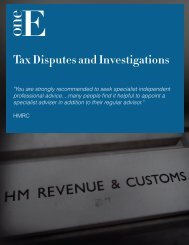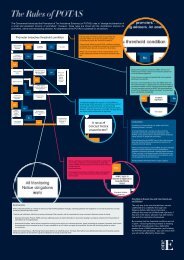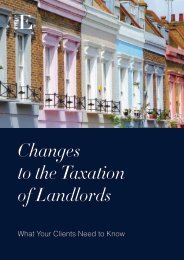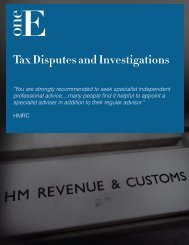Autumn Statement - Analysis
Create successful ePaper yourself
Turn your PDF publications into a flip-book with our unique Google optimized e-Paper software.
<strong>Autumn</strong> <strong>Statement</strong><br />
2015<br />
<strong>Analysis</strong>
With the <strong>Autumn</strong> <strong>Statement</strong> now over, we can reflect on the changes. The big news<br />
is that, despite a number of commentators suggesting that Entrepreneurs’ Relief<br />
could be restricted, no changes were made to this relief (no doubt eliciting a<br />
collective sigh of relief from entrepreneurs). Furthermore other predicted changes,<br />
such as the limitation of incorporation relief for property rental business, have also<br />
not come to fruition.<br />
That being said, the Chancellor’s <strong>Statement</strong> was far from lacking in significant<br />
announcements. From the continued target of residential landlords in the<br />
increasing of SDLT for second homes, to the “Dawn Primarolo moment” for<br />
schemes intended to avoid tax on earned income, or even the major changes to<br />
the treatment of umbrella companies, which could ultimately spell their demise,<br />
there were plenty of changes that advisers will need to brush up on.<br />
1
Contents<br />
BUSINESS & CORPORATION TAX<br />
Company Distributions<br />
Employment intermediaries - tax<br />
relief for travel and subsistence<br />
Employee share schemes -<br />
simplification of the rules<br />
Salary Sacrifice<br />
Apprenticeship Levy<br />
Corporation tax - restitution<br />
interest<br />
PERSONAL TAX<br />
Deeds of Variation<br />
Capital Gains Tax – Payment<br />
Window<br />
Capital Gains Tax (CGT) for<br />
non-UK residents<br />
Secondary Market for Annuities<br />
Inheritance tax and undrawn<br />
pension funds<br />
ISAs<br />
Tax-Free Childcare<br />
Annual Tax on Enveloped<br />
Dwellings (ATED) and 15% rate of<br />
Stamp Duty Land Tax<br />
Taxation of Sporting Testimonials<br />
3<br />
4<br />
5<br />
6<br />
7<br />
8<br />
9<br />
10<br />
TAX AVOIDANCE<br />
Disguised Remuneration<br />
General Anti-Abuse Rule (GAAR)<br />
Serial Avoiders & POTAS<br />
Capital Gains Tax entrepreneurs’<br />
relief - contrived structures<br />
Stamp Duty & Stamp Duty<br />
Reserve Tax Deep In The Money<br />
Options (DITMOs)<br />
Capital Allowances & Leasing<br />
Related Party Rules – partnerships<br />
and transfers of intangible assets<br />
Rules for addressing hybrid<br />
mismatch arrangements<br />
Taxation of asset manager’s<br />
performance based rewards<br />
Tools to encourage voluntary<br />
compliance<br />
TAX EVASION & COMPLIANCE<br />
Criminal offence for tax evasion<br />
Criminal offence for corporates<br />
failing to prevent tax evasion<br />
Civil penalties for tax evasion<br />
Requirement to correct past<br />
offshore tax non-compliance<br />
17<br />
18<br />
19<br />
20<br />
21<br />
22<br />
23<br />
24<br />
INVESTMENTS<br />
Venture capital schemes –<br />
changes to eligible investments<br />
Enterprise Zones<br />
Business Investment Relief<br />
INDIRECT TAXES<br />
Stamp duty land tax - additional<br />
Stamp Duty Land Tax - changes to<br />
the filing and payment process<br />
Stamp Duty Land Tax - Authorised<br />
Property Funds<br />
VAT on sanitary products<br />
Company Car Tax diesel<br />
supplement<br />
2<br />
11<br />
12<br />
13<br />
14<br />
15<br />
16<br />
TAX ADMINISTRATION<br />
“Simple” Assessment<br />
Death of the Tax Return & Making<br />
Tax Digital<br />
Regionalisation<br />
Review of employment status<br />
‘On or Before’ Reporting<br />
Obligation Review<br />
25<br />
26<br />
27
Business &<br />
Corporation Tax<br />
3
Company Distributions:<br />
The Chancellor announced that a consultation<br />
on the rules concerning company<br />
distributions will be published later in the year.<br />
Alongside the consultation, we were advised<br />
that targeted anti-avoidance rules will be<br />
introduced in Finance Bill 2016 to prevent<br />
opportunities for income to be converted to<br />
capital in order to gain a tax advantage, as<br />
well as changes to the Transactions Securities<br />
legislation. It seems that extraction from<br />
companies as capital, rather than income, is<br />
the target here, particularly when considering<br />
the recent changes to Entrepreneur’s Relief<br />
(which will prevent taxpayers from claiming<br />
this relief on the disposal of only a small part<br />
of the business), which are also to be<br />
accelerated.<br />
For now, some very favourable tax planning<br />
opportunities continue to exist for tax efficient<br />
extraction from companies as capital, such as<br />
Capital Reduction planning and even<br />
Company Purchases of Own Shares.<br />
However, it appears that these opportunities<br />
may be short-lived – where this type of<br />
planning is something that clients may wish to<br />
consider, they should be advised to act<br />
quickly before these new rules are<br />
introduced.<br />
4
Employment intermediaries - tax<br />
relief for travel and subsistence:<br />
Despite numerous representations against<br />
the proposals, the Government has<br />
confirmed that it will proceed with legislating<br />
to restrict tax relief for travel and<br />
subsistence expenses for workers engaged<br />
through an employment intermediary, such<br />
as an umbrella company or a personal<br />
service company. In effect, working through<br />
an employment intermediary is likely to<br />
become much more costly than simply<br />
being self-employed. This change will take<br />
effect from 6 April 2016, indicating storms<br />
are on the horizon for the umbrella company<br />
industry.<br />
Employee share schemes -<br />
simplification of the rules:<br />
The Government will introduce a number of<br />
changes to “simplify” aspects of the tax<br />
rules for employee share schemes. Few<br />
details have been announced, though<br />
readers will be mindful that the Revenue<br />
have been known to look to introduce less<br />
favourable tax rules under the auspices of<br />
“simplification” – such as the proposed<br />
“simplification” of inheritance tax on trusts.<br />
We are informed that these changes are<br />
intended to provide more consistency,<br />
including putting beyond doubt the tax<br />
treatment for internationally mobile<br />
employees of certain employment-related<br />
securities (ERS) and ERS options. The new<br />
rules will be introduced under Finance Bill<br />
2016.<br />
5
Salary Sacrifice:<br />
The Government has expressed concern<br />
about the growth of salary sacrifice<br />
arrangements. Evidence is to be gathered<br />
on salary sacrifice arrangements to<br />
determine what, if any, measures are to be<br />
taken in this area.<br />
Apprenticeship Levy:<br />
The Government will introduce the<br />
apprenticeship levy in April 2017, to be set<br />
at a rate of 0.5% of an employer’s paybill,<br />
payable through PAYE. However, each<br />
employer will receive an allowance of<br />
£15,000 to offset against their levy<br />
payment, meaning that the levy will only be<br />
paid on any paybill in excess of £3 million.<br />
Corporation tax - restitution<br />
interest:<br />
The Government has provided that a<br />
special 45% rate of corporation tax on<br />
income is to be applied to restitution<br />
interest, as legislated for in Finance (No. 2)<br />
Act 2015.<br />
6
Personal Tax<br />
7
Deeds of Variation<br />
Advisors will be keen to note that following<br />
the review announced at March Budget<br />
2015, the Government has confirmed that<br />
they will not introduce new restrictions on<br />
how deeds of variation can be used.<br />
Common sense has prevailed.<br />
Capital Gains Tax – Payment<br />
Window:<br />
in line with the increased move to “real time”<br />
tax compliance as part of HMRC’s digital<br />
strategy – to include quarterly online returns<br />
– from April 2019 a payment on account of<br />
any CGT due on the disposal of residential<br />
property will be required to be made within<br />
30 days of the completion. This will not affect<br />
gains on properties which are not liable for<br />
CGT due to Private Residence Relief. Draft<br />
legislation will be published for consultation<br />
in 2016.<br />
Capital Gains Tax (CGT) for non-UK<br />
residents:<br />
The Government will amend the CGT<br />
computations required by non-residents on<br />
the disposal of UK residential property by<br />
removing with retrospective effect from 6<br />
April 2015 a double charge that occurs in<br />
some circumstances and correcting an<br />
omission with effect from 25 November 2015.<br />
The Government will also give HMRC<br />
powers to prescribe circumstances when a<br />
CGT return is not required by non-residents<br />
and will add CGT to the list of taxes that the<br />
Government may collect on a provisional<br />
basis.<br />
8
Secondary Market for Annuities:<br />
The Chancellor has confirmed that the<br />
Government will “remove the barriers” to<br />
creating a secondary market for annuities,<br />
allowing individuals to sell their annuity<br />
income stream. Advisors will be aware that<br />
this is a necessary move, in light of the<br />
decreasing regulations over access to<br />
pension funds. However, few details have<br />
yet been provided – further details on this<br />
measure will be provided in December, in<br />
the Government’s response to the<br />
consultation.<br />
Inheritance tax and undrawn<br />
pension funds:<br />
The Government will legislate to ensure a<br />
charge to inheritance tax will not arise<br />
when a pension scheme member<br />
designates funds for drawdown but does<br />
not draw all of the funds before death, to<br />
be introduced in the Finance Bill 2016.<br />
ISAs:<br />
The Government will maintain the ISA,<br />
Junior ISA and Child Trust Fund annual<br />
subscription limits at their current level for<br />
2016-17. In addition, the list of qualifying<br />
investments for the new Innovative Finance<br />
ISA will be extended in autumn 2016 to<br />
include debt securities offered via<br />
crowdfunding platforms. This represents<br />
some forward thinking on behalf of the<br />
Revenue, as the popularity of Peer-to-Peer<br />
lending platforms as an investment<br />
opportunity continues to grow in the<br />
marketplace.<br />
9
Tax-Free Childcare:<br />
The Government will lower the upper<br />
income limit per parent from £150,000 to<br />
£100,000 and increase the minimum<br />
income level per parent from the equivalent<br />
of 8 hours to 16 hours.<br />
Annual Tax on Enveloped<br />
Dwellings (ATED) and 15% rate of<br />
Stamp Duty Land Tax:<br />
The Government will extend the reliefs<br />
available from ATED and the 15% higher<br />
rate of SDLT to equity release schemes<br />
(home reversion plans), property<br />
development activities and properties<br />
occupied by employees from 1 April 2016.<br />
Taxation of Sporting Testimonials:<br />
Following the consultation announced at<br />
Summer Budget 2015, the Government has<br />
advised that it will legislate to “simplify” the<br />
tax treatment of income from sporting<br />
testimonials. From 6 April 2017, all income<br />
from sporting testimonials and benefit<br />
matches for employed sportspersons will<br />
be liable to income tax. An exemption of up<br />
to £50,000 will be available for employed<br />
sportspersons with income from sporting<br />
testimonials that are not contractual or<br />
customary.<br />
10
Investments<br />
11
Venture capital schemes –<br />
changes to eligible investments:<br />
The Chancellor announced a number of<br />
changes to eligible investments for<br />
venture capital schemes, confirming<br />
excluded activities for Venture Capital<br />
Trusts, EIS and SEIS Seed EIS.<br />
The Government is to exclude energy<br />
generation activities from the schemes, as<br />
well as from the enlarged Social<br />
Investment Tax Relief. Many of these<br />
activities will no longer qualify for relief<br />
from 30th November 2015, with the<br />
remaining activities being excluded from<br />
6th April 2016.<br />
Companies focusing on energy<br />
generation activities have long offered an<br />
attractive proposition, providing assured<br />
returns over the medium to long term in<br />
this area. It appears that the Government<br />
do not consider to be “in the spirit” of<br />
these tax advantaged schemes. Whilst<br />
the move in itself is not surprising, the<br />
repercussions among accountants<br />
advising clients in this area will be<br />
significant, delivering a major blow to the<br />
traditional “safe bets” for these types of<br />
investments.<br />
12
Enterprise Zones:<br />
The Government will expand the<br />
Enterprise Zone programme in England<br />
with the announcement of 18 new sites<br />
across the country and the extension of<br />
8 sites on the current programme.<br />
Enterprise Zones offer a number of<br />
advantages, including 100% enhanced<br />
capital allowances on qualifying plant &<br />
machinery, and significantly reduced<br />
business rates. This can offer significant<br />
advantages for business, and investors,<br />
alongside the disadvantaged areas<br />
themselves.<br />
Business Investment Relief:<br />
The Government will consult on how to<br />
change the Business Investment Relief<br />
rules to encourage greater use of the<br />
relief to increase investment in UK<br />
businesses. This relief offers the<br />
opportunities for non-domiciles to bring<br />
income to capital into the UK without it<br />
being treated as a taxable remittance,<br />
where the funds are used for qualifying<br />
investment purposes. This can offer<br />
some significant advantages to clients,<br />
especially where the investment is used<br />
for tax advantaged investments, such as<br />
EIS or SEIS.<br />
13
Indirect Taxes<br />
14
Stamp duty land tax - additional<br />
properties:<br />
Higher rates of SDLT will be charged on<br />
purchases of additional residential<br />
properties (above £40,000), such as buy<br />
to let properties and second homes,<br />
from 1 April 2016. The higher rates will<br />
be 3% above the current SDLT rates.<br />
Alongside the restriction of tax relief for<br />
landlords, as introduced in Finance Act<br />
(No. 2) 2015, this represents yet another<br />
move to try and discourage residential<br />
property investment. The impact will<br />
likely differ significantly from region to<br />
region. In areas of high capital growth,<br />
such as London, the additional stamp<br />
duty could be mitigated in a matter of<br />
months, whereas other areas where<br />
second properties tend to be holiday<br />
homes, like Cornwall for example, the<br />
impact could be significant.<br />
The Government has announced that it<br />
will consult on the policy detail, including<br />
on whether an exemption for corporates<br />
and funds owning more than 15<br />
residential properties is appropriate.<br />
Stamp Duty Land Tax - changes<br />
to the filing and payment<br />
process:<br />
The Government will consult in 2016 on<br />
changes to the SDLT filing and payment<br />
process, including a reduction in the<br />
filing and payment window from 30 days<br />
to 14 days. These changes will come<br />
into effect in 2017-18.<br />
15
Stamp Duty Land Tax -<br />
Authorised Property Funds:<br />
The Government will introduce a<br />
seeding relief for Property Authorised<br />
Investment Funds and Co-ownership<br />
Authorised Contractual Schemes and<br />
will ensure that SDLT does not arise on<br />
the transactions in units. These<br />
structures may offer another option for<br />
tax-advantaged investments in the future<br />
– the changes will take effect from the<br />
date Finance Bill 2016 receives Royal<br />
Assent.<br />
VAT on sanitary products:<br />
Following the significant media spotlight<br />
in this area, while accepting that we are<br />
– at present – bound by the EU’s rules in<br />
this area – the Government has agreed<br />
to set up a new fund that will make<br />
available £15 million a year, equivalent<br />
to the annual VAT raised on sanitary<br />
products, to support women’s charities<br />
over the course of this Parliament, or<br />
until EU rules are amended to enable the<br />
UK to apply a zero rate of VAT for<br />
sanitary products.<br />
Company Car Tax diesel<br />
supplement:<br />
The 3% differential between diesel cars<br />
and petrol cars will be retained until April<br />
2021.<br />
16
Tax Avoidance<br />
17
Disguised Remuneration:<br />
In another Dawn Primarolo moment the<br />
Chancellor announced that “disguised<br />
remuneration” tax avoidance schemes<br />
may be subject to future legislation,<br />
which will take effect from 25th<br />
November 2015. This represents a “fair<br />
warning” by the Chancellor of<br />
retrospective legislation in this area. This<br />
makes the reliance on schemes<br />
intended to avoid tax on earned income<br />
much more risky in the future, and<br />
highlights the Government’s continued<br />
focus in this area.<br />
General Anti-Abuse Rule<br />
(GAAR):<br />
A new GAAR penalty will be introduced,<br />
of 60% of tax due to be charged, in all<br />
cases successfully tackled by the<br />
GAAR. Perhaps the bigger news is that<br />
the Government intends to make<br />
changes to the way the GAAR works to<br />
improve its ability to tackle marketed<br />
avoidance schemes – we await further<br />
detail in this area. Although the<br />
increased penalties will continue to act<br />
as further deterrent, until the GAAR is<br />
tested in the Courts we will not know if it<br />
is effective legislation or merely a paper<br />
tiger.<br />
18
Serial Avoiders & POTAS:<br />
New measures are to be introduced for<br />
those who persistently enter into tax<br />
avoidance schemes that are defeated<br />
by HMRC. These include a special<br />
reporting requirement and a surcharge<br />
on those whose latest return is<br />
inaccurate due to use of a defeated<br />
scheme, the names of such avoiders<br />
being published and, for those who<br />
persistently abuse reliefs, restrictions on<br />
them accessing certain tax reliefs for a<br />
period. The Government is also<br />
widening the Promoters of Tax<br />
Avoidance Schemes (POTAS) regime,<br />
targeting promoters of “regularly<br />
defeated” schemes.<br />
Capital Gains Tax entrepreneurs’<br />
relief - contrived structures:<br />
Although Entrepreneurs’ Relief itself<br />
remains unaffected in the <strong>Autumn</strong><br />
<strong>Statement</strong>, the Government has<br />
announced that it will consider bringing<br />
forward legislation to amend the<br />
changes made by Finance Act 2015 to<br />
Entrepreneurs’ Relief, in order to support<br />
businesses by ensuring that the relief is<br />
available on certain genuine commercial<br />
transactions.<br />
19
Stamp Duty & Stamp Duty<br />
Reserve Tax - Deep In The<br />
Money Options (DITMOs):<br />
Shares transferred to a clearance<br />
service or depositary receipt issuer as a<br />
result of the exercise of an option will<br />
now be charged the 1.5% higher rate of<br />
stamp duty based on either their market<br />
value or the option strike price,<br />
whichever is higher. This is intended to<br />
prevent avoidance using DITMOs, which<br />
are options with a strike price<br />
significantly below (for call options) or<br />
above (for put options) market value.<br />
The change will apply to options which<br />
are entered into on or after 25 November<br />
2015 and exercised on or after Budget<br />
2016.<br />
Capital Allowances & Leasing:<br />
From 25 November 2015, two types of<br />
avoidance involving capital allowances<br />
and leasing have been legislated<br />
against. These changes will prevent<br />
companies from artificially lowering the<br />
disposal value of plant and machinery<br />
for capital allowances purposes, and<br />
make any payment received for<br />
agreeing to take responsibility for tax<br />
deductible lease related payments<br />
subject to tax as income.<br />
20
Related Party Rules –<br />
partnerships and transfers of<br />
intangible assets:<br />
The intangible fixed asset rules are to be<br />
amended, with regards to the tax<br />
treatment on transfers of assets to<br />
partnerships. The intention is to ensure<br />
that partnerships cannot be used in<br />
arrangements that seek to obtain a tax<br />
relief for their corporate members in a<br />
way that is contrary to the intention of<br />
the regime. This change has immediate<br />
effect. A more thorough review of the<br />
intangible assets regime is also being<br />
considered.<br />
Rules for addressing hybrid<br />
mismatch arrangements:<br />
New legislation is to be introduced with<br />
effect from 1 January 2017 to implement<br />
the agreed OECD rules for addressing<br />
hybrid mismatch arrangements. The new<br />
rules will prevent multinational<br />
enterprises avoiding tax through the use<br />
of certain cross-border business<br />
structures or finance transactions.<br />
Taxation of asset manager’s<br />
performance-based rewards<br />
Legislation is to be introduced to<br />
determine when performance awards<br />
received by asset managers will be<br />
taxed as income or capital gains – an<br />
award will be subject to income tax,<br />
unless the underlying fund undertakes<br />
long term investment activity.<br />
21
Tools to encourage voluntary<br />
compliance:<br />
New measures are to be introduced to<br />
improve large business tax compliance,<br />
with a consultation over the summer to<br />
refine the detail of the measures, to<br />
include: a new requirement that large<br />
businesses publish their tax strategies; a<br />
special measures regime to tackle<br />
businesses that persistently engage in<br />
aggressive tax planning; and a<br />
framework for cooperative compliance.<br />
22
Tax Evasion<br />
& Compliance<br />
23
Criminal offence for tax evasion:<br />
In a move that will be of great concern, not<br />
only for those advising in tax, but in law more<br />
generally, a new criminal offence is to be<br />
introduced removing the need to prove intent<br />
for the most serious cases of failing to<br />
declare offshore income and gains.<br />
Criminal offence for corporates<br />
failing to prevent tax evasion:<br />
A new criminal offence will also be<br />
introduced for corporates which fail to<br />
prevent their agents from criminally<br />
facilitating tax evasion by an individual or<br />
entity.<br />
Civil penalties for tax evasion:<br />
The Government will increase civil penalties<br />
for deliberate offshore tax evasion, including<br />
the introduction of a new penalty linked to the<br />
value of the asset on which tax was evaded<br />
and increased public naming of tax evaders.<br />
Penalties are also to be introduced for those<br />
who enable offshore tax evasion, including<br />
public naming of those who have enabled the<br />
evasion.<br />
Requirement to correct past offshore<br />
tax non-compliance:<br />
The Government will consult on an additional<br />
requirement for individuals to correct any<br />
past offshore non-compliance with new<br />
penalties for failure to do so.<br />
24
Tax Administration<br />
25
“Simple” Assessment:<br />
The Government will publish draft legislation<br />
that will enable a new process for paying tax.<br />
This will be used for taxpayers in<br />
self-assessment who have simple tax affairs<br />
where HMRC already holds all the data it<br />
needs to calculate the tax liability, and where<br />
existing payment processes are not available.<br />
Taxpayers will be sent a calculation which will<br />
be a legally enforceable demand for<br />
payment, and taxpayers will be able to<br />
challenge and appeal these calculations. This<br />
represents a drastic shift from the typical<br />
self-assessment process, and at present we<br />
have little information on what will constitute<br />
“simple tax affairs”. These new rules will<br />
come into effect in the 2016-17 tax year.<br />
Death of the Tax Return & Making<br />
Tax Digital:<br />
The Government is set to invest £1.3 billion to<br />
transform HMRC into one of the most digitally<br />
advanced tax administrations in the world.<br />
Most businesses, self-employed people and<br />
landlords will be required to keep track of<br />
their tax affairs digitally and update HMRC at<br />
least quarterly via their digital tax account,<br />
giving rise to concern from tax practitioners<br />
that the Revenue is seeking to drive out their<br />
involvement, with increased risk of<br />
non-compliance as a result. This will not<br />
apply to individuals in employment, or<br />
pensioners, unless they have secondary<br />
incomes of more than £10,000 per year. A<br />
consultation on the Government’s plans in this<br />
area is to follow in 2016.<br />
26
Regionalisation:<br />
HMRC is to consolidate from 170 offices to 13 large,<br />
modern regional centres, resulting in significant<br />
operational changes in the Revenue in the future.<br />
Review of employment status:<br />
The Government has responded to the final report of<br />
the Office of Tax Simplification review of employment<br />
status and is taking forward some of the<br />
recommendations.<br />
‘On or Before’ Reporting Obligation<br />
Review:<br />
the two year temporary relaxation, allowing existing<br />
micro-employers using Real-Time PAYE to report all<br />
payments they make in a tax month on or before the<br />
last payday in the tax month rather than on or before<br />
each and every payday, will end as planned on 5<br />
April 2016.<br />
27
Springfield House<br />
Springfield Court<br />
Summerfield Road<br />
Bolton<br />
Greater Manchester<br />
BL3 2NT<br />
t. 01204 559914<br />
e: info@oneegroup.com<br />
w: oneegroup.com












